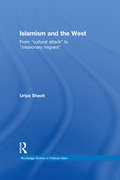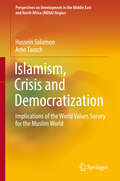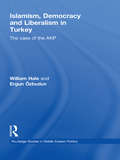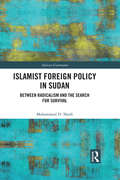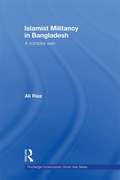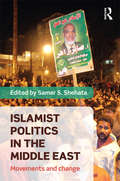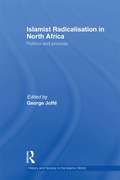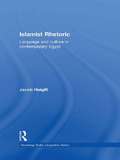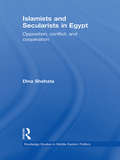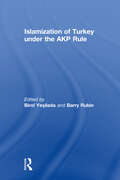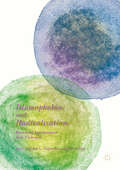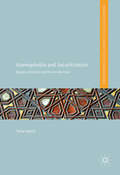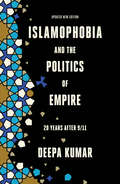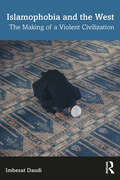- Table View
- List View
Islamism and the West: From "Cultural Attack" to "Missionary Migrant" (Routledge Studies in Political Islam)
by Uriya ShavitOffering a unique analysis of Islamist ideology, Islamism and the West attempts to explain how- and why-mainstream Islamist leaders have, for the past century, developed and canonized theories which depict theWest as engaged in a sophisticated conspiracy to undermine Muslim identity by cultural means, while morallycollapsing and yearning for the spiritual salvation brought by Muslim migrants. This book demonstrates how seemingly triumphalist Islamist writings served, in fact, to legitimize pragmatic concessions undertaken by Islamists – from cooperating with regimes allied with the West, to encouraging Muslim migration to Christian lands. Following the Arab Spring, and with Islamism becoming a dominant force in Middle Eastern politics, Islamism and the West is an essential reading for the understanding of a region in transition Providing new insights on familiar concepts including ‘cultural imperialism,’ ‘liberal democracy,’ and ‘civilisational decline,’ this book will be of use to students of Middle Eastern and Islamic Studies, Political Science, Migration Studies and Cultural Studies.
Islamism, Arab Spring, and the Future of Democracy: World System and World Values Perspectives (Perspectives on Development in the Middle East and North Africa (MENA) Region)
by Leonid Grinin Andrey Korotayev Arno TauschThis book provides an in-depth analysis of public opinion patterns among Muslims, particularly in the Arab world. On the basis of data from the World Values Survey, the Arab Barometer Project and the Arab Opinion Index, it compares the dynamics of Muslim opinion structures with global publics and arrives at social scientific predictions of value changes in the region. Using country factor scores from a variety of surveys, it also develops composite indices of support for democracy and a liberal society on a global level and in the Muslim world, and analyzes a multivariate model of opinion structures in the Arab world, based on over 40 variables from 12 countries in the Arab League and covering 67% of the total population of the Arab countries. While being optimistic about the general, long-term trend towards democracy and the resilience of Arab and Muslim civil society to Islamism, the book also highlights anti-Semitic trends in the region and discusses them in the larger context of xenophobia in traditional societies. In light of the current global confrontation with radical Islamism, this book provides vital material for policy planners, academics and think tanks alike.
Islamism, Crisis and Democratization: Implications of the World Values Survey for the Muslim World (Perspectives on Development in the Middle East and North Africa (MENA) Region)
by Hussein Solomon Arno TauschThis book systematically assesses the value systems of active Muslims around the globe. Based on a multivariate analysis of recent World Values Survey data, it sheds new light on Muslim opinions and values in countries such as Indonesia, Iran, Tunisia, Egypt and Turkey. Due to a lack of democratic traditions, sluggish economic growth, escalating religiously motivated violence, and dissatisfaction with ruling elites in many Muslim countries, the authors identify a crisis and return to conservative values in the Muslim world, including anti-Semitism, religious and sexual intolerance, and views on democracy and secularism, business and economic matters. Based on these observations, they offer recommendations for policymakers and civil societies in Muslim countries on how to move towards tolerance, greater democratization and more rapid economic growth.
Islamism, Democracy and Liberalism in Turkey: The Case of the AKP (Routledge Studies in Middle Eastern Politics)
by Ergun Ozbudun William HaleThe Justice and Development Party (AKP) were elected to power in 2002 and since then Turkish politics has undergone considerable change. This book is a comprehensive analysis of the AKP, in terms not just of its ideological agenda, but also of its social basis and performance in office in the main theatres of public policy – political reform, and cultural, economic and foreign policies. Based on an extensive analysis of official and party documents, interviews, academic sources and media coverage, the book outlines the main features of the current global debate on the relationship between Islam, Islamism and democracy. While most top AKP leaders come from an Islamist background, the party has behaved as a moderate, centre-right, conservative democratic party who are fully committed to democracy, a free market economy and Turkey’s EU membership. The book explores and analyses these changes in Turkish politics, and provides coverage of the workings of the contemporary Turkish political systems, policy and ideological issues that go to the heart of Turkish identity. Filling a gap in the existing Turkish and English literature on the subject, this book will be an important contribution to Political Science, particularly the areas of Turkish politics, Middle Eastern studies, Islamic studies and comparative politics.
Islamist Extremism in Kosovo and the Countries of the Region (SpringerBriefs in Criminology)
by Kolë KrasniqiThis brief analyzes the social, historical and societal circumstances influencing the emergence of Islamist extremism in Kosovo and countries of the region. It discusses the creation of propagandist infrastructure by foreign organizations to spread radical ideology and instigate inter-religious conflicts in order to establish an Islamist extremist movement, and highlights the camouflaged activities of humanitarian organizations funding terrorism. This brief focuses particularly on examining the development and concrete manifestation of Islamism and the latent risks posed by Islamist extremism not just for the national security of Kosovo but also for the peace and safety of the entire region.Examining the development, effects and latent risks posed by Islamist extremism in the Balkans, Islamist Extremism in Kosovo and the Countries of the Region will be useful to scholars, policy-makers, and law enforcement practitioners working in counter-terrorism, as well as those interested in the unique sociopolitical climate of the Balkans.
Islamist Foreign Policy in Sudan: Between Radicalism and the Search for Survival (African Governance)
by Mohammed H. SharfiExamining the role played by ideology, internal politics and key figures within Sudan after the 1989 coup, this book analyses policymaking in the Sudanese administration in-depth and studies its effect on international and domestic politics and foreign policy. The military coup undertaken in June 1989 by the Sudanese Islamist movement, known to them as the ‘National Salvation Revolution’, established Sudan as a central actor in the instability of the region. This book explores the foreign policy, international and domestic politics of the new government, from post-coup Sudan to the present day. The intriguing political issues in Sudanese foreign policy during the period pose many questions regarding the dynamics of the government’s domestic and international policymaking. Studying the fragmentation of the Islamist movement into various political bodies, this book examines the role of foreign policy as a contentious point of Sudanese domestic politics. Islamist Foreign Policy in Sudan also looks at the major factors in the relations of Sudan, such as the civil war, terrorism and human rights issues. Islamist Foreign Policy in Sudan will be of interest to students and scholars of international relations, African politics, human rights studies and Islamic studies.
Islamist Militancy in Bangladesh: A Complex Web (Routledge Contemporary South Asia Series)
by Ali RiazIn an unprecedented show of force, organization and skill, two proscribed Islamist militant organizations exploded more than 450 bombs within a span of less than an hour throughout Bangladesh on 17 August 2005 sending a strong message that they were a force to be reckoned with. This catastrophic event, followed by a number of suicide attacks, forced the then reluctant Bangladeshi government, a coalition of center-right parties with two Islamists among them, to acknowledge the existence of a network of militants and take action against this threat. Against this backdrop, this book is the first academic study on the growing Islamist militancy in Bangladesh. It examines the relevance, significance and trajectories of militant Islamist groups in Bangladesh, exploring the complex web of domestic, regional and international events and dynamics that have both engendered and strengthened Islamist militancy in Bangladesh. The three factors - domestic, regional and international aspects - are each discussed separately and their connection and links are analyzed. It goes on to consider possible future trajectories of militant Islamism in Bangladesh. This book addresses an issue of great importance for contemporary Bangladeshi politics, and will be of interest to scholars of international politics and security studies, including terrorism and the politics of South Asia.
Islamist Politics in the Middle East: Movements and Change
by Samer S. ShehataFor over three decades, Islamist politics, or political Islam, has been one of the most dynamic and contentious political forces in the Middle East. Although there is broad consensus on the importance of political Islam, there is far less agreement on its character, the reasons for Islamist’s success, the role of Islamist movements in domestic and international affairs, or what these movements portend for the future. This volume addresses a number of central questions in the study of Islamist politics in the Middle East through detailed case studies of some of the region’s most important Islamist movements. Chapters by leading scholars in the field examine the Egyptian Muslim Brotherhood, Hamas, Hizbullah, Morocco’s Justice and Benevolence, the Jordanian Muslim Brotherhood, the Sunni Insurgency in Iraq and Islamist politics in Turkey and Iran. The topics addressed within this volume include social networks and social welfare provision, Islamist groups as opposition actors, Islamist electoral participation, the intersection of Islam and national liberation struggles, the role of religion in Islamist politics, and Islam and state politics in Iran, among other topics. All of the contributing authors are specialists with deep knowledge of the subject matter who are committed to empirically based research. These scholars take Islamists seriously as modern, sophisticated, and strategic political players. Together, their work captures much of the diversity of Islamist politics in the region and will contribute to the scholarship on a topic that continues to be important for the Middle East and the world.
Islamist Radicalisation in North Africa: Politics and Process (History and Society in the Islamic World)
by George JofféIn the current climate of political extremism and violence, much attention has been directed towards "radicalisation" as the reasons behind such courses of action, along with a conviction that those who are radicalised represent an irrational deviation from the conventionally accepted norms of social and political behaviour. This book focuses on the current issues and analytical approaches to the phenomenon of radicalisation in North Africa. Taking a comprehensive approach to the subject, it looks at the processes that lead to radicalisation, rather than the often violent outcomes. At the same time, chapters expand the discussion historically and conceptually beyond the preoccupations of recent years, in order to develop a more holistic understanding of a complex individual and collective process that has represented a permanent challenge to dominant political, social and, on occasion, economic norms. With contributions from academics and policy-makers within and outside the region, the book is a comprehensive investigation of Islamist Radicalisation. As such, it will be of great interest to academics and students investigating North Africa and terrorism, as well as specialists in radicalism and extremism.
Islamist Rhetoric: Language and Culture in Contemporary Egypt (Routledge Arabic Linguistics Series)
by Jacob HoigiltIslamism in Egypt is more diversified in terms of its sociology and ideology than is usually assumed. Through linguistic analysis of Islamist rhetoric, this book sheds light upon attitudes towards other Muslims, religious authority and secular society. Examining the rhetoric of three central Islamist figures in Egypt today - Yusuf al-Qaradawi, Amr Khalid and Muhammad Imara - the author investigates the connection between Islamist rhetoric and the social and political structures of the Islamic field in Egypt. Highlighting the diversity of Islamist rhetoric, the author argues that differences of form disclose sociological and ideological tensions. Grounded in Systemic Functional Grammar, the book explores three linguistic areas in detail: pronoun use, mood choices and configurations of processes and participants. The author explores how the writers relate to their readers and how they construe concepts that are central in the current Islamic revival, such as ‘Islamic thought’, ‘Muslims’, and ‘the West’. Introducing an alternative divide in Egyptian public debate - between text cultures rather than ideologies - this book approaches the topic of Islamism from a unique analytical perspective, offering an important addition to the existing literature in the areas of Middle Eastern society and politics, Arabic language and religious studies.
Islamist Terrorism and Democracy in the Middle East
by Katerina DalacouraWhat were the reasons behind the terrorist attacks of September 11th? Does the cause of Islamist terrorism relate to the lack of democracy in the Middle East? Through detailed research into the activities of both radical and moderate organizations across the Middle East, such as the Muslim Brotherhood, Hamas and Hizbullah, and via interviews with key personnel, Katerina Dalacoura investigates whether repression and political exclusion pushed Islamist entities to adopt terrorist tactics. She also explores whether inclusion in the political process has had the opposite effect of encouraging Islamist groups toward moderation and ideological pragmatism. In a challenge to the conventional wisdom, she concludes that Islamist terrorism is not a direct consequence of authoritarianism in the Middle East and that there are many key factors that generate radicalism.
Islamistischer Antisemitismus: Studie zu muslimischen Moscheegemeinden in Österreich (Wiener Beiträge zur Islamforschung)
by Michael Kramer Ednan AslanDie Zunahme antisemitischer Vorfälle in Europa hat durch die neue Zuwanderung aus islamischen Ländern in Europa eine neue Dimension erreicht. In den medialen Debatten wird immer wieder auf die Rolle von Imamen oder praktizierenden Muslim*innen in den Fokus der öffentlichen Debatte gerückt. Dieses Buch geht auf die theologischen und historischen Hintergründe der jüdisch-muslimischen Beziehungen ein und untersucht mögliche antisemitische Hintergründe der aktuellen antisemitischen Ausschreitungen in Europa, aber auch in islamischen Ländern. Dazu wurden am Beispiel Österreichs mit Imamen und Moscheebesucher*innen gesprochen und ihre Aussagen analysiert.
Islamistischer Terrorismus in Deutschland: Analyse der Täterprofile deutscher Syrienrückkehrer auf Basis von Gerichtsakten
by Kristin WeberTerrorismus ist noch immer eines der bedrohlichsten Phänomene der heutigen Zeit. In diesem Buch werden mithilfe von Gerichtsakten vom Generalbundesanwalt beim Bundesgerichtshof in Karlsruhe die Radikalisierungsprozesse von 58 deutschen Jihadisten analysiert. Durch das umfassende Datenmaterial ist es möglich, die Wege dieser Personen von der Radikalisierung bis zum Anschluss an eine terroristische Organisation im Ausland (u.a. Islamischer Staat) sowie ausgeübte strafrechtlich relevante Handlungen zu rekonstruieren. Mithilfe einer Netzwerkanalyse wird das radikale Netzwerk untersucht, das aus Deutschland mit Jihadkämpfern im In- und Ausland verbunden gewesen ist. Dabei wird ein Augenmerk auf den Aufbau, die Funktionsweise und die Schlüsselpersonen des Netzwerks gelegt. Auch werden die unterschiedlichen Rollen und Unterstützungshandlungen der Netzwerkmitglieder in den Fokus genommen. Zusätzlich werden strafrechtlich relevante Radikalisierungs- und Mobilisierungsstrategien salafistisch-jihadistischer Prediger entschlüsselt, die weitaus tiefere Verbindungen zu terroristischen Organisationen im Ausland haben als bisher angenommen.
Islamists and Secularists in Egypt: Opposition, Conflict & Cooperation (Routledge Studies in Middle Eastern Politics)
by Dina ShehataIn a detailed analysis of the continued survival of authoritarian governments in the Arab world, this book uses Egypt as a case study to address the timely and complex issue of democratization in the Middle East. This book examines how relations between different actors in the Egyptian opposition have contributed to the endurance of authoritarianism in Egypt over the past three decades. The author argues that the longevity of the authoritarian government is not only a function of the strength and cohesion of the regime, but is also related to the weaknesses and divisions between opposition groupings, particularly between Islamists and non-Islamists. Looking at how such ideological differences and mobilizational asymmetries have impeded successful cooperation between different opposition groups, and how this allows the authoritarian regime to successfully ensure its continued hegemony, the author illustrates the extent to which opposition strategies profoundly affect successful transitions to democracy in the Arab world. Highlighting the main obstacles to democratic political reform in the region, the author provides important insights for the promotion of democracy in the region which will be a valuable addition to the literature on Middle Eastern politics and government.
Islamists of the Maghreb (Routledge Studies in Political Islam)
by Jeffry R. Halverson Nathaniel GreenbergIn 2011, the Maghreb occupied a prominent place in world headlines when Sidi Bouzid, Tunisia, became the birthplace of the so-called Arab Spring. Events in Tunisia sparked huge and sometimes violent uprisings. Longstanding dictatorships fell in their wake. The ensuing democratic reforms resulted in elections and the victory of several Islamist political parties in the Arab world. This book explores the origins, development and rise of these Islamist parties by focusing on the people behind them. In doing so, it provides readers with a concise history of Sunni Islam in North Africa, the violent struggles against European colonial occupation, and the subsequent quest for an affirmation of Muslim identities in its wake. Exploring Islamism as an identity movement rooted in the colonial experience, this book argues that votes for Islamist parties after the Arab Spring reflected a universal human need for an authentic sense of self. This view contrasts with the popular belief that support for Islamists in North Africa reflects a dangerous "fundamentalist" view of the world that seeks to simply impose archaic religious laws on modern societies. Rather, the electoral success of Islamists in the Maghreb, like Tunisia's Ennahdha party, is rooted in a reaffirmation of the Arab-Islamic identities of the Maghreb states, long delayed by dictatorships that mimicked Western models and ideologies (e.g., Socialism). Ultimately, however, it is argued that this affirmation is a temporary phenomenon that will give way in time to the fundamental need for good governance, accountability, and a stable growing economy in these countries. Written in an accessible format, and providing fresh analytical perspectives on Islamism in the Maghreb, this book will be a valuable tool for students and scholars of Political Islam and North African Politics.
Islamization of Turkey under the AKP Rule
by Barry Rubin Birol YeşiladaThis book examines the decade in office of the Justice and Development Party (AKP) and its efforts to transform the Turkish republic toward a more Islamist-oriented system. If it succeeds, Turkey’s dramatic shift will be the most important change in the Middle East power balance since the 1979 Iranian revolution and will have equally devastating effects on Western interests.For more than 80 years Turkey has been ruled by the secular democratic structures created by Kemal Ataturk. Now, however, the rise of the Justice and Development Party (AKP) and its series of electoral victories are creating a new system. Whilst portraying itself as a centre-right reform party, the AKP has been accused of having an Islamist agenda. After almost a decade in power, there is serious evidence that this claim is true. At home, the AKP has been changing basic Turkish attitudes and institutions, from buying up a large portion of the country’s media to revising its laws, and even taking the lead in the writing of a new constitution. Internationally, Turkey has moved away from the West and Israel toward Iran and radical Islamist groups. While its intentions—and ability to fulfil them—are still unclear, the AKP has been leading the most important transformation of Turkey since the formation of the republic after World War I. This book systematically examines the AKP’s ideology, support base, actions in office, and goals.This book was published as a special issue of the Turkish Studies.
Islamophobia and Everyday Multiculturalism in Australia (Studies in Migration and Diaspora)
by Randa Abdel-FattahThis book explores Islamophobia in Australia, shifting attention from its victims to its perpetrators by examining the visceral, atavistic nature of people’s feelings and responses to the Muslim ‘other’ in everyday life. Based on ethnographic fieldwork, Islamophobia and Everyday Multiculturalism sheds light on the problematisations of Muslims amongst Anglo and non-Anglo Australians, investigating the impact of whiteness on minorities’ various reactions to Muslims. Advancing a micro-interactional, ethnographically oriented perspective, the author demonstrates the ways in which Australia’s histories and logics of racial exclusion, thinking and expression produce processes in which whiteness socializes, habituates and ‘teaches’ ‘racialising’ behaviour, and shows how national and global events, moral panics, and political discourse infiltrate everyday encounters between Muslims and non-Muslims, producing distinct structures of feeling and discursive, affective and social practices of Islamophobia. As such, it will be of interest to social scientists with interests in race and ethnicity, migration and diaspora and Islamophobia.
Islamophobia and Racism in America
by Erik LoveChoice Top Book of 2017 Confronting and combating Islamophobia in America.Islamophobia has long been a part of the problem of racism in the United States, and it has only gotten worse in the wake of shocking terror attacks, the ongoing refugee crisis, and calls from public figures like Donald Trump for drastic action. As a result, the number of hate crimes committed against Middle Eastern Americans of all origins and religions have increased, and civil rights advocates struggle to confront this striking reality. In Islamophobia and Racism in America, Erik Love draws on in-depth interviews with Middle Eastern American advocates. He shows that, rather than using a well-worn civil rights strategy to advance reforms to protect a community affected by racism, many advocates are choosing to bolster universal civil liberties in the United States more generally, believing that these universal protections are reliable and strong enough to deal with social prejudice. In reality, Love reveals, civil rights protections are surprisingly weak, and do not offer enough avenues for justice, change, and community reassurance in the wake of hate crimes, discrimination, and social exclusion. A unique and timely study, Islamophobia and Racism in America wrestles with the disturbing implications of these findings for the persistence of racism—including Islamophobia—in the twenty-first century. As America becomes a “majority-minority” nation, this strategic shift in American civil rights advocacy signifies challenges in the decades ahead, making Love’s findings essential for anyone interested in the future of universal civil rights in the United States.
Islamophobia and Radicalization: Breeding Intolerance and Violence
by John L. Esposito Derya InerWhile the themes of radicalization and Islamophobia have been broadly addressed by academia, to date there has been little investigation of the crosspollination between the two. Is Islamophobia a significant catalyst or influence on radicalization and recruitment? How do radicalization and Islamophobia interact, operate, feed one another, and ultimately pull societies toward polar extremes in domestic and foreign policy? The wide-ranging and global contributions collected here explore these questions through perspectives grounded in sociology, political theory, psychology, and religion. The volume provides an urgently needed and timely examination of the root causes of both radicalization and Islamophobia; the cultural construction and consumption of radical and Islamophobic discourses; the local and global contexts that fertilize these extreme stances; and, finally, the everyday Muslim in the shadow of these opposing but equally vociferous forces.
Islamophobia and Securitisation: The Dutch Case
by Tahir Abbas Liselotte WeltenThis book examines how Muslim communities in the Netherlands perceive and experience extremism, counter-radicalisation policies, and Islamophobia. It is based on the findings of two original qualitative research investigations conducted in the Netherlands, in which thirty scholars, imams, mosque board members, and representatives of Islamic organisations were interviewed. The book delves into topics such as the politicisation of the Dutch media, misunderstandings about ‘radicalisation’ and how they contribute to securitisation, and how Dutch Muslims have been confronted with the dilemma of dealing with radicalisation on their own, while also facing further vilification, securitisation, and Islamophobia, all of which continue to be issues. Additionally, the study examines the significance of ‘radical Salafi’ ideology and recruitment techniques as seen by Dutch Muslim communities.
Islamophobia and Securitization
by Tania SaeedThis book explores everyday realities of young Muslim women in Britain, who are portrayed as antithetical to the British way of life in media and political discourse. The book captures how geo-political events, and national tragedies continue to implicate individuals and communities at the domestic and local level, communities that have no connection to such tragedies and events, other than being associated with a religio-ethnic identity. The author shows how Muslim women are caught within the spectrum of the vulnerable-fanatic, always perceived to be 'at risk' of being 'radicalized'. Focusing on educated Muslim females, the book explores experiences of Islamophobia and securitization inside and outside educational institutions, and highlights individual and group acts of resistance through dialogue, with Muslim women challenging the metanarrative of insecurity and suspicion that plagues their everyday existence in Britain. Islamophobia and Securitization will be of interest to scholars and students researching Muslims in the West, in particular sociologists, anthropologists, and political scientists. It will also appeal to analysts and academics researching security and terrorism, race and racialization, as well as gender, immigration, and diaspora.
Islamophobia and Securitization: Religion, Ethnicity and the Female Voice (Palgrave Politics of Identity and Citizenship Series)
by Tania SaeedThis book explores everyday realities of young Muslim women in Britain, who are portrayed as antithetical to the British way of life in media and political discourse. The book captures how geo-political events, and national tragedies continue to implicate individuals and communities at the domestic and local level, communities that have no connection to such tragedies and events, other than being associated with a religio-ethnic identity. The author shows how Muslim women are caught within the spectrum of the vulnerable-fanatic, always perceived to be ‘at risk’ of being 'radicalized'. Focusing on educated Muslim females, the book explores experiences of Islamophobia and securitization inside and outside educational institutions, and highlights individual and group acts of resistance through dialogue, with Muslim women challenging the metanarrative of insecurity and suspicion that plagues their everyday existence in Britain. Islamophobia and Securitization will be of interest to scholars and students researching Muslims in the West, in particular sociologists, anthropologists, and political scientists. It will also appeal to analysts and academics researching security and terrorism, race and racialization, as well as gender, immigration, and diaspora.
Islamophobia and the Politics of Empire
by Deepa KumarIn response to the events of 9/11, the Bush administration launched a "war on terror" ushering in an era of anti-Muslim racism, or Islamophobia. However, 9/11 alone did not create Islamophobia. This book examines the current backlash within the context of Islamophobia's origins, in the historic relationship between East and West. Deepa Kumar is an associate professor of media studies and Middle East studies at Rutgers University and the author of Outside the Box: Corporate Media, Globalization and the UPS Strike. Kumar has contributed to numerous outlets including the BBC, USA Today, and the Philadelphia Inquirer.
Islamophobia and the Politics of Empire: 20 years after 9/11
by Deepa KumarA critically acclaimed analysis of anti-Muslim racism from the sixteenth to the twenty-first centuries, in a fully revised and expanded second editionIn this incisive account, leading scholar of Islamophobia Deepa Kumar traces the history of anti-Muslim racism from the early modern era to the &“War on Terror.&” Importantly, Kumar contends that Islamophobia is best understood as racism rather than as religious intolerance. An innovative analysis of anti-Muslim racism and empire, Islamophobia argues that empire creates the conditions for anti-Muslim racism, which in turn sustains empire. This book, now updated to include the end of the Trump&’s presidency, offers a clear and succinct explanation of how Islamophobia functions in the United States both as a set of coercive policies and as a body of ideas that take various forms: liberal, conservative, and rightwing. The matrix of anti-Muslim racism charts how various institutions—the media, think tanks, the foreign policy establishment, the university, the national security apparatus, and the legal sphere—produce and circulate this particular form of bigotry. Anti-Muslim racism not only has horrific consequences for people in Muslim-majority countries who become the targets of an endless War on Terror, but for Muslims and those who &“look Muslim&” in the West as well.With a new foreword by Nadine Naber.
Islamophobia and the West: The Making of a Violent Civilization
by Imbesat DaudiThis book provides an engaging and insightful look into the definitions, discourse and experiences of Islamophobia and its steady rise since 9/11. It analyses concepts and binaries that are drawn around discussions on civilization, religious dogma, violence, and race. Is there a link between Islam and violence? Why does the West feel threatened by it? The author critically examines these questions and the birth of hate politics which packages hate in a marketable format and often demonizes victims. It also looks at the role of the media in the West in perpetuating stereotypes and its consequences and the nature of war reportage in Islamic countries while deconstructing the narrative of the clash of civilizations. Topical and lucid, this book is a must-read for students and scholars of sociology, international relations, peace and conflict studies, political science, Islamic studies and for other readers interested in these topics.
